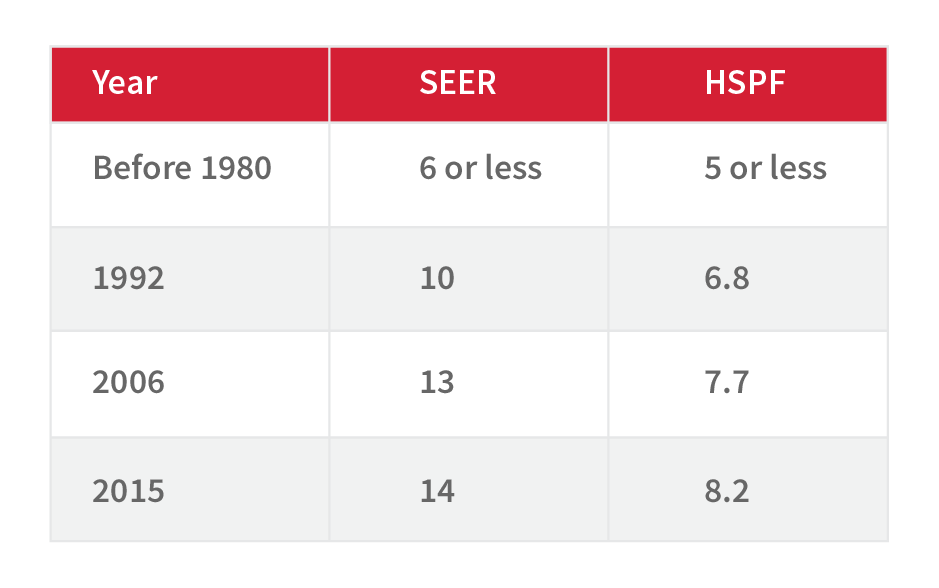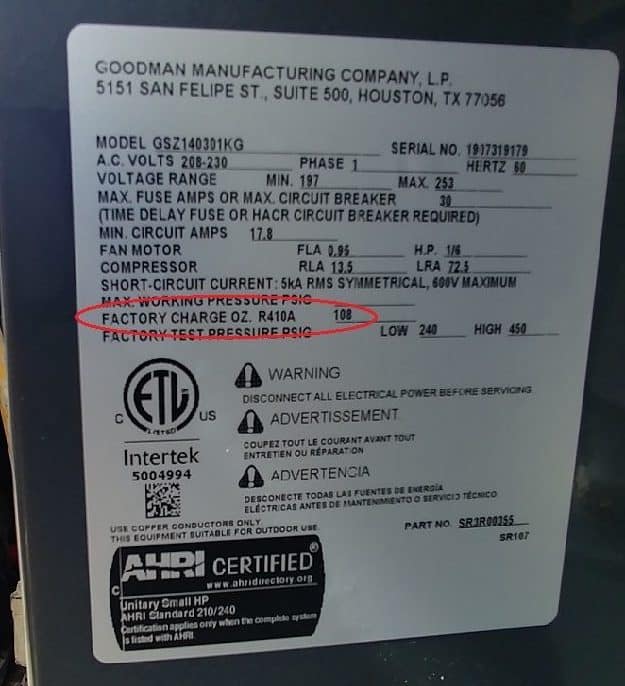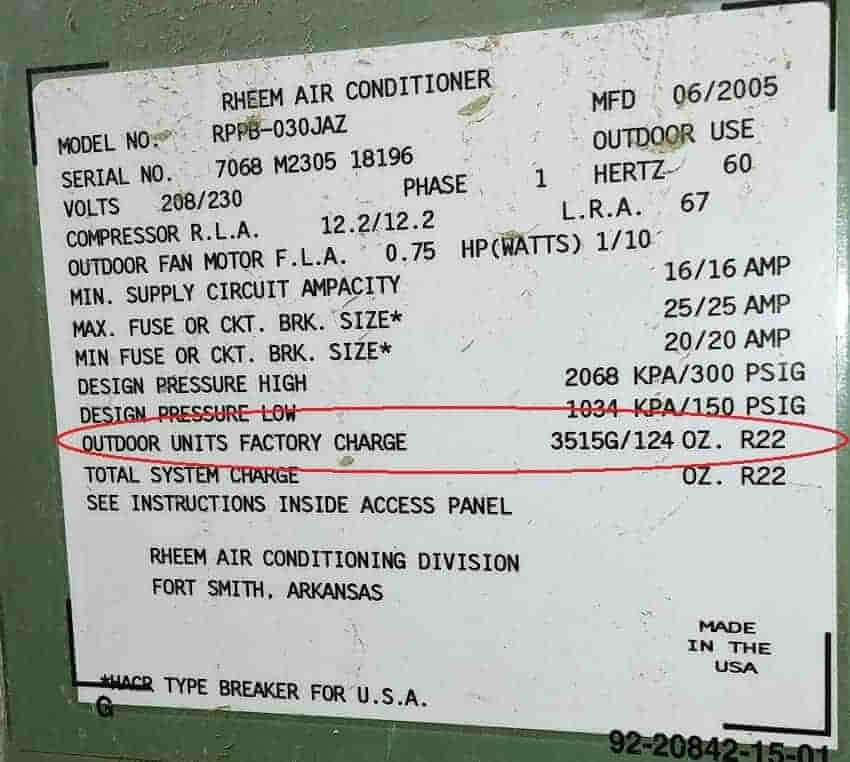It totally depends on the capacity or size of your heat pump. Residential heat pumps come in sizes ranging from 1-1/2 to five tons of refrigeration.
The word “tons of refrigeration” does not refer to the weight of the equipment, but to the capacity, with one ton equaling 12,000 BTU’s. 12,000 BTU’s is enough to cool approximately 500 square feet of residential space depending on the number of people, quantity of insulation, and how tight the home may be. The climate is a huge factor also, are you in Alaska or Texas.
| BTU’S | Tons | Ounces | Pounds |
| 18,000 | 1 1/2 | 72 | 4.5 |
| 24,000 | 2 | 96 | 6 |
| 30,000 | 2 1/2 | 120 | 7.5 |
| 36,000 | 3 | 144 | 9 |
| 42,000 | 3 1/2 | 168 | 10.5 |
| 48,000 | 4 | 192 | 12 |
| 60,000 | 5 | 240 | 15 |
Now you have a guesstimate of total Freon in a 2.5 ton unit.
These weights are base on an average of three pounds of refrigerant per ton of cooling capacity. They are approximate and should not be used to determine an exact or most effective level of refrigerant to operate any heat pump efficiently.
The above chart lists the common residential unit sizes. Each size of residential heat pump comes in different efficiencies and those various efficiencies contain different amounts of refrigerant. Now you should see why you have to look at the installation instructions.
Efficiencies are rated in SEER and HSPF. Depending on the age and efficiency the amount of refrigerant in your system could vary.

I’m trying my best to detemine why someone would ask how much Freon their heat pump would contain. The only reason I can think of is you are asking this question because a technician added Freon to your heat pump and you want to know if it’s a legitimate amount?
The amount of Freon is located on the label of your outdoor unit. This Goodman 2.5 ton heat pump contains 108 ounces of R410A refrigerant. R410A is the new standard for residential heating and air conditioning equipment. Less harmful to our atmosphere than it’s most common predecessor R22.

This next label shows data for a Rheem 2.5 ton heat pump. This unit contains 124 ounces of R22. Even though the label says “Rheem Air Conditioner” it’s still a heat pump. Read this article if you want to understand the difference between an air conditioner and a heat pump.

But Wait! There’s More Freon In Your System
However, the amount of refrigerant listed on your label is not the complete amount.
The installation instructions associated with your equipment instruct the installer to add or subtract amounts of refrigerant depending on the distance from the outdoor unit to the indoor unit.
HVAC equipment factories only include an estimated amount of gas in your new heat pump or ac unit. Another calculation needs to take place with each installation.
The copper tubing length between the two units contains refrigerant (Freon). I found this easy peasy calculator at inchcalculator.com that will give you an idea of the amount to be added.
Just enter the type of refrigerant (either R-22 or R-410A), the full length of refrigeration tubing, and the size of each copper tube. You’ll probably want to convert the inches to feet unless you are of that other discipline that just had to confuse things with cm and m.
How Often Does A Heat Pump Need Refrigerant?
The best comparison to know how often an HVAC unit would need refrigerant would be to related it to your refrigerator. Most people don’t recharge their refrigerators and you heat pump system (or air conditioner) should be no different.
In the HVAC industry standards exist that determine how much refrigerant should be added over and over again. I hope you are not being charged year after year for adding refrigerant to your system.
If so, fire your HVAC company and find one that will fix the leaks. Refrigerant does not just naturally go away or have to be replenished.
It’s common for refrigeration systems to leak. But good techs have the right training and tools to find these leaks. There are a lot of systems out there that have never leaked.
Over several years of yearly maintenance it is possible for a system to become a fraction lower because of the repetitive use of refrigeration gauges being attached to a unit. Each time a tech removes his gauges you loose a indiscriminate amount.
How Do I know If My Heat Pump Has Freon?
I was reading an answer to this question and I had to laugh out loud. “It will no longer work properly”
But how would the average consumer know that?
Considering that the system we are referring to is an air to air heat pump with electric backup.
When the outdoor unit quits the house will still heat by means of the auxiliary or supplemental heat and you have to be kind of “tuned in” if you know what I mean, to notice the difference.
When summer comes I have several customers that call and say they have no cooling. Well they actually had no heat pump heating during the winter. They didn’t notice the outdoor unit not working properly even with the very high electric bills created by heating with straight electric resistance heat from there furnace.
Most heat pumps come with what’s called a low pressure switch. When the amount of refrigerant in the system drops below a certain point the compressor will shut off. Sometimes they automatically restart.
It’s would be difficult for an inexperienced person to determine if the compressor is running, over the noise of the outdoor fan.
In the heating mode you can place your hand over the large pipe leaving the unit that leads to the indoor unit (you may have to pull back a little pipe insulation) . If it’s warm the compressor is running. But, this is still not a good indication of correct refrigerant charge.
In the cooling mode do the same thing only the large pipe should now be very cold.
Conclusion
The determining factor for having the correct refrigerant charge in a heat pump is having a professional who knows how to set the proper charge. Winter time charging for heat pumps is more difficult than doing that process in the summer.
An experienced technician can set the charge to gain the most efficiency for your particular system. If you have repetitive problems with leaks it may be time for a new system.
If you feel you are being taken advantage of then get a new tech or service company.
